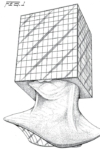by Max Rivlin-Nadler
The Invisible Bridge, Julie Orringer’s ornate debut, details the lives of two Hungarian-Jewish brothers, destitute but ardent intellectuals, who leave Hungary to pursue higher education in Western Europe. Unfortunately, they chose Fall 1937 to study abroad, and soon Europe will plunge into tragedy. Despite finding love, inhabiting bohemian circles, and winning prestigious awards, they are all too quickly summoned back east by the beginning of World War II. Made to serve at forced labor camps while Hungary stalls the inevitable invasion by Hitler, Orringer deliberately spins a believable melodrama.
Andras Lévi, the focus of the text, is more consumed by his love for the older ballet teacher Klara than by the darkening horizon. It’s the wrenching description of holy love that gives the novel a momentum that carries it through its 600 pages, pages that are able to tuck away gems like “If fire dwelt secretly in the snow, how could he escape burning?” next to flowery descriptions of Austro-Hungarian architecture. Orringer doesn’t linger on the brutality of the camps, only using them to contrast relative comfort and safety with absolute pain and danger. The brief leaves granted to the laborers, which take up a healthy portion of the second half of the novel, are where the tenuous circumstances of these individuals, still afforded humanity despite their horrible conditions, are brilliantly portrayed. The novel attempts to trace the insistent need for stability amidst circumstances completely out of the characters’ control. One week Andras is in bed with Klara, the next he is on the Eastern Front. Brought to France on a scholarship, then stripped of his visa, and thrown back into Hungary, Andras has little authority or agency at any point in the narrative.
Orringer waits until the Epilogue to reveal that the novel is based on the lives of her Jewish-Magyar grandparents. She concludes by inserting a poem by the Polish poet Wislawa Szymborska. The poem is called “Any Case,” and it breaks down survival of the war to its simplest elements. No amount of cunning or watchful spirit could really have assured one’s safety. The Invisible Bridge is insistent in its attention to the survival of humanity in dark times, while admitting that even high romance is all a matter of brutal chance.
This post may contain affiliate links.







